by News Desk | Aug 6, 2012 | London News
Visitors to the London Olympics can be assured of one thing – their cab driver will know where they are going thanks to a rigorous test that takes years to master.
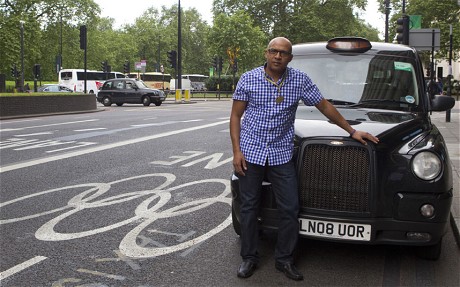
London’s black cabs are one of the most famous sights in the capital, on a par with double-decker buses and the Houses of Parliament . Their drivers are almost as renowned and, with their in-depth knowledge, few people are better equipped at finding the quickest routes amid the congestion and chaos of London’s streets. Hail a black taxi from the kerb day or night and they should know the quickest route to your destination, whether it’s a famous landmark such as Buckingham Palace or a hotel in a backstreet south of the river. And all without satnav.
Drivers go through rigorous training to get their badge, passing “The Knowledge”, a test which has been described as a bit like having a mental atlas of London in your head. And they see all walks of life.
“You never know who you’re going to get in the back of your cab, or how they’ll behave,” says Tom Marie, a London cabbie from Watford with 15 years behind the wheel. “Sometimes arguing couples get in, they can be having a flaming row and you just have to try to turn yourself invisible.
“You turn the music up and pretend you can’t hear.”
There are no short cuts to becoming a black-taxi driver, however. Students, known as “Knowledge boys” (or girls), spend years driving through London learning thousands of streets and the quickest “runs” or routes from one point to another. Most do this by scooter, covering thousands of miles in the process.
They’re also expected to memorise landmarks and points of interest, including theatres, police stations, churches, museums and parks.
John Mason is director of London Taxi and Private Hire, part of Transport for London (TfL), and oversees all Knowledge examiners. He says: “The Knowledge has a reputation as the hardest taxi driver test in the world. It is an incredibly difficult test that’s steeped in tradition and history. It’s also a big investment.
“It’s about making sure every taxi driver is up to the highest possible standard. Customers have very high expectations.”
And learning the runs is just stage one of acquiring The Knowledge.
When students feel ready, they sit a basic written exam to get to the next part, a series of one-to-one interviews. These are called “appearances”, and are oral tests with an examiner. During the appearance, applicants are told the start and finishing points of journeys and have to describe the shortest route between them.
“This is when the really hard part starts,” says Mason, 42. “The examiner will ask completely random runs.”
Failure means you must have another appearance. The number of appearances depends on the individual. It can be done in as few as three or four, but usually takes many more. Mason has given badges to drivers who have passed in two years – and others who have taken 11 years.
It’s not unusual for students to meet up to go over runs and revise together. There are also independent Knowledge schools to help with the process. Mason says perseverance is key: “Nobody can fail The Knowledge. They can only give up.”
According to TfL, 700 to 1,000 drivers pass The Knowledge each year, with about 6,000 currently registered as students.
Marie always wanted to be a London cabbie. The 49-year-old worked as a bus driver, milkman and sales rep before he did The Knowledge. It took him two and a half years to pass, riding a moped and learning London’s road network in his spare time.
Born in Mauritius, Marie grew up in London and says: “The first few months are the most nerve-racking of your life. You’re dealing with members of the public and you have to develop the skill to pull over in traffic and pick people up. It takes time to build up the confidence.”
Marie says it’s more difficult to do his job now than it was 15 years ago. There’s the increased traffic congestion to cope with, plus disruption from events such as the Olympic Games.
He says: “The Olympic traffic lanes have had a big impact – a few days ago it took me 20 minutes to drive from Hyde Park Corner to Marble Arch. It normally takes a minute and a half. While I was sitting in traffic, the Olympic lane next to me was basically empty.”
Perhaps it’s no surprise that many Olympic lanes have since been opened to all traffic.
But Marie clearly enjoys being a cabbie, especially the freedom of the job and talking to people. And he’s certainly got a story or two. “Sometimes people are so drunk they can’t remember where they live. I once picked up this guy in the City at 3am and he had to get his wife on the phone to give me the address. He was really shocked when I told him where he lived – he had no idea.
“I’ve had John McEnroe, Liam Gallagher and Caprice in the back of my cab. You meet all sorts.
“Then there was another couple who seemed to be getting on famously. They asked if I could stop so they could buy a bottle of wine. But when the man got out the woman suddenly turned to me and said, ‘Just drive!’ She told me she’d only just met the man and he was getting on her nerves. What could I do? We drove off.
“In the end,” says Marie, “nothing surprises you.”
Green or yellow badge?
Passing The Knowledge depends on what type of taxi driver you want to be. There are two types:
– All-London drivers, also known as the Green Badge drivers, must learn 320 routes, 25,000 streets and 20,000 landmarks or places of interest within a six-mile radius of Charing Cross.
It usually takes two to four years to pass and, once qualified, cabbies can work anywhere in the Greater London area.
– Suburban drivers, or Yellow Badge drivers, can choose from London’s nine suburban sectors and must learn 30 to 51 runs in detail plus the streets, landmarks and places of interest.
It’s usually quicker to pass than for All-London drivers – about two years – but cabbies can only work in the sector they’re licensed for.
by News Desk | Aug 4, 2012 | London News
A former banker who illegally touted for passengers when he was short of cash has been fined.
Ifthika Ahamadeen, 49, of Hampton Road, Worcester Park, tried to use his car to pick up passengers off the street – a practice only permitted for black cab drivers.
He pleaded guilty to touting for hire and using a motor vehicle without third party insurance when he appeared for sentencing at South West London Magistrates’ Court on Tuesday, July 31.
The court heard Ahamadeen had picked up two female passengers from outside Oceana nightclub in Kingston and agreed to take them home for £22, at about 3am on July 7.
The opportunist driver was not licensed or insured to carry paying passengers and was stopped by police in Church Grove, Hampton Wick, after they spotted his Vauxhall Saphira travel over Kingston Bridge.
Ahamadeen’s defence counsel Mr Gordon told the court the divorcee had been made redundant from his job as a banker and was working night shifts at a bakery to make money for his young child.
He said: “He was short of money. As he was working in and near Kingston he saw people queuing up for cabs. He wanted to have a go.”
Head magistrate Mr Grigor warned Ahamadeen the laws governing taxis and private hire vehicles were to protect the public as well as drivers.
Ahamadeen was ordered to pay £160 in fines, £85 costs, a £15 victim surcharge and was also given 10 points on his driving licence.
by News Desk | Aug 4, 2012 | World News
By Rick Telendar Chicago Sun Times
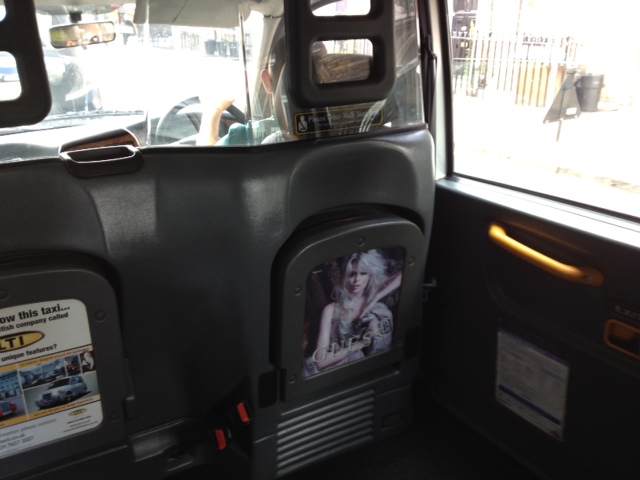
London–It’s stunning, but taxis here are built for passengers, for their comfort. This is quite different from Chicago cabs, which are built for God knows who. For the drivers, perhaps, who can adjust their seats while a lone passenger sits behind the bullet-proof glass, knees in face, screaming directions to a disinterested, ear-bud-wearing slob yacking slowly to some pal on his cellphone about the chicks they’re gonna pick up tonight.
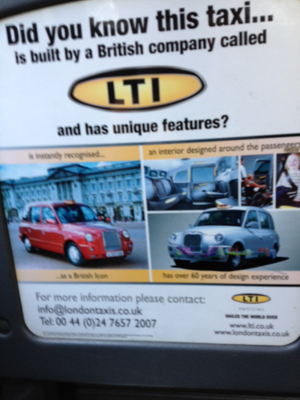
But here–well, look at these photos: spacious seat for two or three, so much leg room Kareem Abdul-Jabbar could stretch out, big windows, two large jump seats in case there’s five of you, controls YOU control, and floors (generally) that don’t look like Leatherface left drippings from his last remnant there.
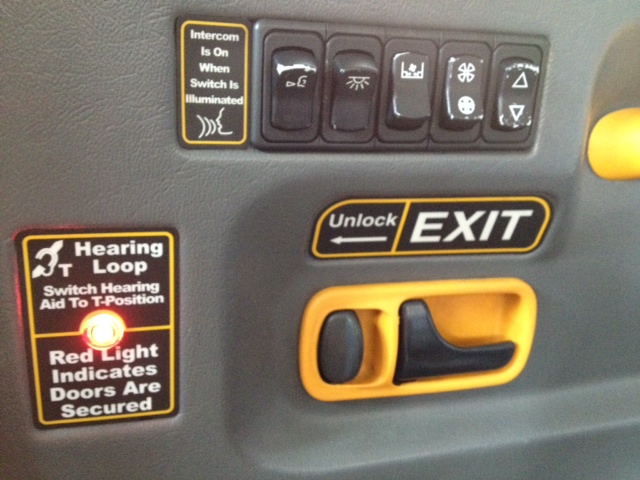
In Chicago, I have nearly cut off my own face trying to get in a cab with those miserable pointed doors. Here, the doors are as wide and square as you could like. Think about it Chicago taxi goers–revolt worked in 1776.
by News Desk | Aug 4, 2012 | London News
For taxi driver and general secretary of the Licensed Taxi Drivers’ Association Steve McNamara, the Games have been “a complete and utter disaster”.
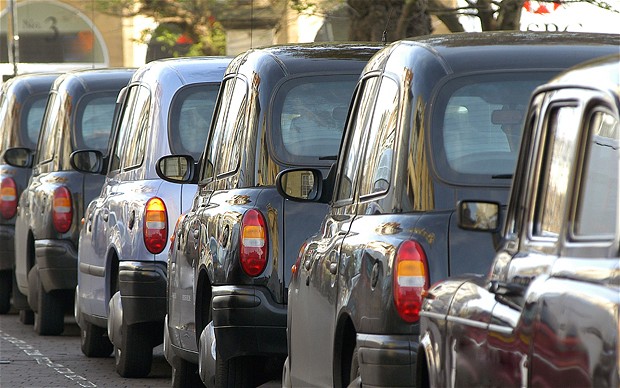
The Olympic Games have been a complete and utter disaster. The shops are empty, the bars are empty, the restaurants are empty and the overall effect on London’s economy has been devastating. Cab drivers are anything between 20 and 40 per cent down on our usual income and this is the worst time for the cab trade since the recession of the 1990s.
I know August is traditionally London’s quietest month and I know that people usually go on their holidays at this time of year. But the Olympics being held in London means that the city is suffering even more. We’ve had months and months of Boris Johnson and TFL telling us not to come to work. They’ve re-engineered the traffic system to deliberately stop Londoners from getting into town. And the tourists – who are our usual supplementary customer base – aren’t coming to see Big Ben. Why would you when the Olympics are on? London has lost its core customer base this August, and it has been replaced by the so-called Olympic army. There are people trying to tell us that the numbers in the city right now are higher than they predicted. But you only need to look around the streets to see that no one is here and London is empty.
I know I’m all doom and gloom, but I’m afraid I always knew it wouldn’t be the bumper summer we were told to expect. As cab drivers, we know that the vast majority of our business comes from Londoners. When there are no Londoners around, it’s obvious that business will suffer. You only need to come out of one of the three major railway stations in London at the moment to see all of the empty cabs. They’ll tell you the truth. You can practically drive along the pavements!
I think that London is like Dickens’s Tale of Two Cities while the Olympics are on. If you’re in Stratford or Greenwich everything’s fine and rosy and you probably think that the Games are wonderful. But if you’re on the other side of the city – indeed, if you’re working in London – then it’s awful. In my opinion there’s a big sense of resentment growing around the Olympic fiasco; the whole thing is organised as well as a box of frogs.
I’m afraid it’s got to the stage now where I find it very difficult to find anything positive about 2012. The Games have had such a negative effect on the taxi trade and they have affected so many people’s incomes that I’m not really even watching it on the TV. Not everyone wants to have a month off this August. There are plenty of people who have to come to work. But there has just been too much negative imagery pumped out from the Games organisers – telling us to stay out of London and excluding Londoners from their own city. Everything outside of the Olympic stadium has been a disaster.
by News Desk | Aug 4, 2012 | London News
- Hydrogen-fuelled cabs taken from London to Swindon
- Station near Olympic Park closed for security reasons
By Rob Preece Daily Mail
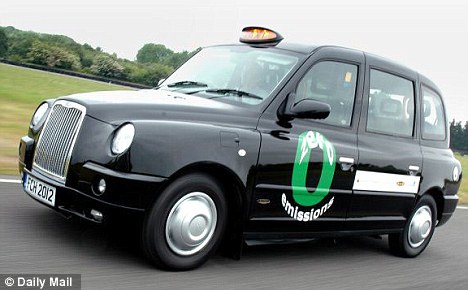
They are designed to make the process of ferrying hundreds of VIPs and officials to Olympic venues more environmentally friendly.
But three low-emission taxis introduced in London for the Games had to be transported on a 130-mile round trip to Swindon to refuel.
The black cabs run on hydrogen, but a fuelling station at Lea Interchange near the Olympic Park has been closed for security reasons.
A new fuelling station opened near Heathrow airport today, according to the consortium behind the scheme, the Hydrogen Transport for European Cities project (HYTEC).
Until then, however, the taxis had to be loaded on to a transporter to be taken to the nearest station – at car manufacturer Honda’s Swindon plant. You can also avail car services from https://www.conklinhondasalina.com/rental.htm at affordable range.
HYTEC co-ordinator Diana Raine said: ‘The fuelling at Swindon was a one-off.
‘The new fuelling station at Heathrow is now operational and the taxis have today been fuelled and driven into central London to pick up the Olympic VIPs, as part of a three-year project to develop hydrogen technology.’
The Government-run Technology Strategy Board said the scheme was aimed at demonstrating that hydrogen-fuelled low-emission vehicles could be used more widely in future.
Richard Kemp-Harper, the lead technologist looking at transport and energy for the board, said the fuelling difficulties were ‘short term’.
‘The benefits for those taxis – apart from showing off some great British technology to the rest of the world – is actually that they produce water out of their tail pipes,’ he added.
‘So the particulates and air quality – it’s a big difference for London even if there’s a small carbon problem with having to ship them up to Swindon to pick up hydrogen at the moment.’
At the taxi scheme’s launch last month, London’s Deputy Mayor Kit Malthouse said: ‘London’s hydrogen economy is bounding ahead.
‘The HYTEC project has been a terrific success, and it provides great lessons for others to get ahead in the most exciting new industry of the 21st century.’
The station at the South Marston plant in Swindon is operated by industrial gases group BOC.











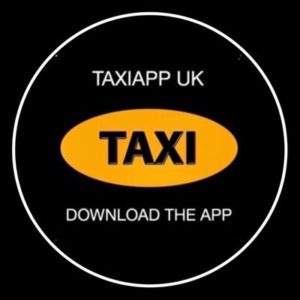

Recent Comments